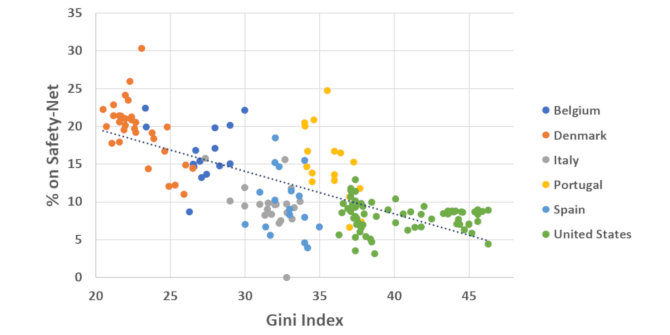 Far right parties typically oppose the European Union, yet European integration has paradoxically provided the far right with funding, visibility and a higher degree of credibility and respectability. Drawing on the case of the French Rassemblement National, Marta Lorimer explains how the EU may have inadvertently facilitated the success of some of its strongest critics.
Far right parties typically oppose the European Union, yet European integration has paradoxically provided the far right with funding, visibility and a higher degree of credibility and respectability. Drawing on the case of the French Rassemblement National, Marta Lorimer explains how the EU may have inadvertently facilitated the success of some of its strongest critics.
Far right parties are strong critics of the European Union, however, they also benefit enormously from the process of European integration. The European Parliament elections’ low salience and proportional system of voting has made it easier for them to gain seats. As members of the European Parliament, they have had access to important financial resources. As MEPs, they have also had opportunities to build transnational links with likeminded parties. Somewhat paradoxically, then, the EU has provided strong Eurosceptic actors with the symbolic and material resources to become more prominent.
In a recent paper, I argue that Europe can function as a powerful ideological resource for far right parties. Engaging with the issue of European integration makes it possible for them to reorient their ideology in a more acceptable fashion and speak both to their traditional electorate and to new supporters.
Two characteristics of the issue of European integration support this process. First, as a relatively new political issue and one that has no clear ideological answer, it leaves far right parties with some leeway in the positions they adopt. As such, it makes it possible for them to craft a position that is appealing to their traditional voters and to new voters alike.
Second, far right parties can benefit from the divisiveness of European integration to present their positions as more acceptable. In fact, European integration has divided political parties and electorates alike, as close results in several EU referendums (including Brexit) have shown. This makes European integration a topic on which disagreement is acceptable and where it may be easier for parties to present a more widely appealing political message.
The French Rassemblement National (formerly, Front National) offers a good illustration of these trends. Since the 1980s, the party has frequently claimed to be ‘pro-Europe, but anti- EU’. It has presented itself as a fierce defender of European civilisation against the political project of the European Union. This line of argument was well exemplified by Marine Le Pen in a 2017 speech where she said that ‘even though we are resolutely opposed to the European Union, we are resolutely European, I’d go as far as saying that it is because we are European that we are opposed to the European Union.’

Marine Le Pen speaking in the European Parliament in 2016, Credit: © European Union 2016 – European Parliament (CC BY-NC-ND 4.0)
Claiming to be pro-Europe but anti-EU makes it possible for the party to attract new voters by presenting a ‘softer’ face to the public. Instead of appearing as mere French nationalists, it presents them as a group that cares about its neighbouring nations. At the same time, it also relies on a notion of a closed identity that is key to the FN’s traditional discourse. While this identity is brought up to a higher level, it remains present and divides ‘Europeans’ and ‘non-Europeans.’
In a similar fashion, the Rassemblement National often relies on accepted notions of sovereignty, independence and autonomy to critique the European Union. A good example of this line of argument is provided by the party’s 2004 European election programme, which claimed that ‘A nation’s sovereignty is its ability to take decisions freely and for itself. It refers then to the notions of independence and exercise of political power by a legitimate government. The entire history of the European construction consists of depriving States of their sovereignty.’
The notions of sovereignty, freedom, and independence the Rassemblement National relies upon here are perfectly compatible with the party’s nationalism because they stress the idea that a nation should be able to govern itself. However, they also draw on more common discourses about national states and may therefore carry a broader appeal. They also resonate with common critiques about the European Union as suffering from a ‘democratic deficit’, or, at the very least, having a conflicted relationship with national sovereignty. This provides them with the ‘ring of truth.’
Opposition to European integration is frequently presented as a marker of marginalisation for parties. This research contests this assumption: Euroscepticism, when well-phrased, can in fact function as a powerful tool for legitimation that far right parties can seize upon. In particular, it provides parties with additional resources to craft an appealing political message and become established actors. The EU, then, may have inadvertently facilitated the success of some of its strongest critics.
For more information, see the author’s accompanying paper in the Journal of European Public Policy
Please read our comments policy before commenting.
Note: This article gives the views of the author, not the position of EUROPP – European Politics and Policy or the London School of Economics.
_________________________________
 Marta Lorimer – University of Exeter / LSE
Marta Lorimer – University of Exeter / LSE
Marta Lorimer is a Postdoctoral Research Associate at the University of Exeter and a Guest Teacher, London School of Economics and Political Science.





